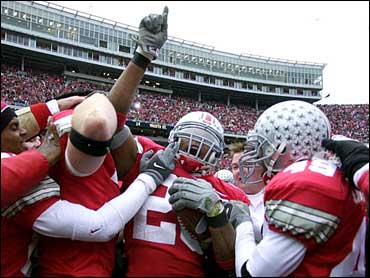October 29, 2003
College Football, Bowl Championships & Anti-Trust: Mid-Size Division I Schools Take It to Capitol Hill

The Buckeyes of Ohio State were Last Season's Champs
 Tulane University president Scott Cowen went to Capitol Hill today to testify before the Senate Judiciary Committee on the allegedly unfair and anticompetitive restrictions and exclusions of the Bowl Championship Series, or BCS, used to determine which Division I football teams compete in postseason collegiate bowl games and ultimately determine the national champion.
Tulane University president Scott Cowen went to Capitol Hill today to testify before the Senate Judiciary Committee on the allegedly unfair and anticompetitive restrictions and exclusions of the Bowl Championship Series, or BCS, used to determine which Division I football teams compete in postseason collegiate bowl games and ultimately determine the national champion.
Cowen hopes to replace the system when it is scheduled to expire in 2005, but whether the BCS should be the subject of an antitrust action is up for debate. While it’s true that to automatically qualify for an elite BCS bowl game, a team must finish in the top six in the BCS rankings, and in the top 12 just to be eligible, the BCS actually expanded, rather than inhibiting, competition – which will prove to be a key question in federal antitrust legal action. The process certainly favors the nation's six powerhouse football conferences plus Notre Dame, leaving most mid-major teams to fight through and maintain undefeated status to earn even a glimmer of hope at qualifying. And, in a quote from the AP story on the subject, the undefeated Texas Christian University "Horned Frogs" are barely hanging on to hopes of going all the way:
- Now 8-0, the Horned Frogs follow in the footsteps of the Marshall University Thundering Herd and the Tulane University Green Wave before them as "little schools that could," but ultimately could not because they were shut out of the BCS bowls by a process critics say is unduly restrictive and exclusive.
To automatically qualify for an elite BCS bowl game, a team must finish in the top six in the BCS rankings and in the top 12 just to be eligible. The process favors the nation's six powerhouse football conferences and Notre Dame. The Horned Frogs are currently 12th.
It was 1998 when Tulane went through its season undefeated, but had to settle for playing in the Liberty Bowl because the more prestigious bowls were taken by big-name teams, most with losses on their records.
Another excerpt from a USA Today article:
- Officials from BCS conferences have disagreed. Jim Delany, commissioner of the Big Ten, said at last month's House hearings that "the bowl system is more open than it's ever been. Any team can qualify to play in the national championship game."
Others testifying before the Senate committee: NCAA President Myles Brand, Orange Bowl chairman Keith Tribble, Nebraska Chancellor Harvey Perlman as well as retired football coach LaVell Edwards, whose 1984 Brigham Young team was the last national champ from outside the six conferences now in the BCS (in 1984, the first time since 1945 prior to that).
BCS officials have already said they expect the system will change after the current TV contract expires at the end of the 2005 season.
Tom Hansen, commissioner of the Pacific-10, which is a BCS conference, has said that neither a "full" playoff nor the status quo is acceptable, "but everything in between is still up for discussion."
There are plenty of options. Edwards said Monday that he'd "hate" to see the bowl system "destroyed." He suggests they offer satisfying opportunities: "You can go to a bowl and raise your finger like No. 1 and say at least you won the Dotcom Bowl or whatever they're calling it."
Options that have been discussed by BCS schools include keeping the four major bowls but allowing entry to undefeated non-BCS schools and adding a fifth bowl and giving a slot to the highest-rated league champion from outside the BCS.
Cowen also suggests the Big East, which now has an automatic berth that might be lost in the wake of Miami, Virginia Tech and Boston College exiting the conference, might become "natural allies" of anti-BCS forces.
Cowen, who favors a playoff system, says he's not swayed by objections he's heard to that format. Cowen says the notion that a playoff might place undue demands on student-athletes is unconvincing because "basketball is already more intrusive than football."
Cowen also says he's not impressed by worries that a playoff might make college football seem too much like the pros: "I don't think anything could be more commercialized than what we have right now."
So, do you want Congress as the arbiter and regulator of college football championships or would you rather see a few corrupt CEO’s indicted instead?
- Arik
Posted by Arik Johnson at October 29, 2003 02:45 PM | TrackBack "Competitive Intelligence applies the lessons of competition and principles of intelligence to the need for every business to gain awareness and predictability of market risk and opportunity. By doing so, CI has the power to transform an enterprise from also-ran into a real winner, with agility enough to create and maintain sustainable competitive advantage."
"Competitive Intelligence applies the lessons of competition and principles of intelligence to the need for every business to gain awareness and predictability of market risk and opportunity. By doing so, CI has the power to transform an enterprise from also-ran into a real winner, with agility enough to create and maintain sustainable competitive advantage."
